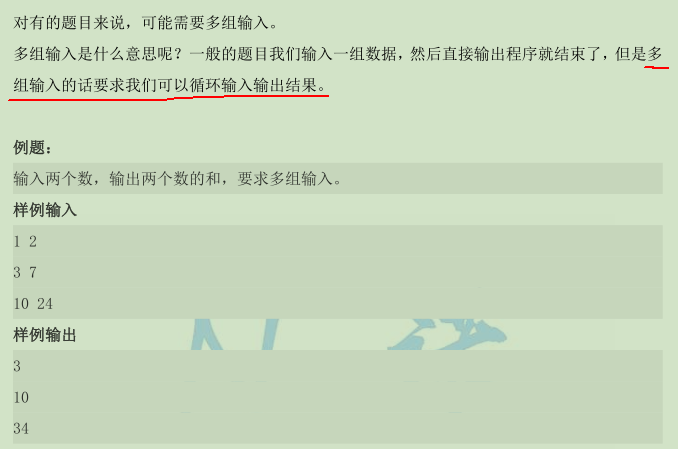《N诺机试指南》(三)STL使用
喵喵与呱呱 人气:11.vector
2.queue
3.stack
4.map
5.set
6.多组输入输出问题
详解见代码以及注释:
//学习STL的使用
#include <bits/stdc++.h>
using namespace std;
int main(){
// 1.使用vector
// vector<int> v;//也可以vector<string类型>
// for(int i=0; i<=10; i++){
// v.push_back(i*i);//加入到vector中去
// }
// for(int i=0; i<v.size(); i++){//范围0~v.size()
// cout << v[i] << " ";//访问vector元素
// }
// cout << endl;
// 2.使用queue
// queue<int> q;//定义一个空队列
// //先进先出
// q.push(1);//入队
// q.push(2);
// q.push(3);
// while( !q.empty() ){//队列不为空
// cout << q.front() << " ";//取出队首元素
// q.pop();//出队
// }
// 3.使用stack栈
// stack<int> s;
// //后进先出
// s.push(1);
// s.push(2);
// s.push(3);
// while( !s.empty() ){
// cout << s.top() << " ";
// s.pop();
// }
// 4.使用map(key-value)键值对
// map<string, int> dict;//定义一个map
// //key:string类型,value:int类型
// dict["tom"] = 1;//定义映射关系
// dict["jack"] = 2;
// dict["xiaxia"] = 6;
// if( dict.count("xiaxia") ){//如果存在"xiaxia",count("xiaxia")=true
// cout << "xiaxia is very" << dict["xiaxia"];
// }
// //使用迭代器遍历map的key和value
// map<string, int>::iterator it;//定义迭代器
// for(it=dict.begin(); it!=dict.end(); it++){
// cout << it->first << ":" << it->second << endl;
// }
// dict.clear();//清空map
// 5.使用set
// set<string> s;
// s.insert("安徽");
// s.insert("陕西");
// s.insert("北京");
// s.insert("上海");
// set<string>::iterator it;
// for(it=s.begin(); it!=s.end(); it++){
// cout << *it << " ";
// }
// cout << endl;
// s.erase("北京");
// s.erase("上海");
// for(it=s.begin(); it!=s.end(); it++){
// cout << *it << " ";
// }
// cout << endl;
// if( s.count("陕西") ){
// cout << "陕西 I'm coming!" << endl;
// }
// s.clear();//清空set
// 6.多组输入输出问题
// //6.1:C语言版
// int a, b;
// while( scanf("%d %d", &a, &b)!=EOF ){
// printf("%d", a+b);
// }
// //6.2:C++语言版
// int a, b;
// while( cin >> a >> b ){
// cout << a+b << endl;
// }
return 0;
}
补充:多组输入输出问题:



加载全部内容